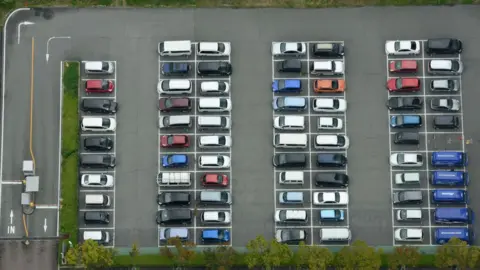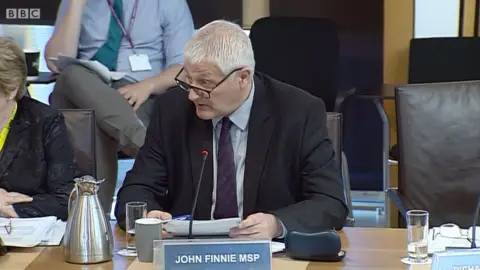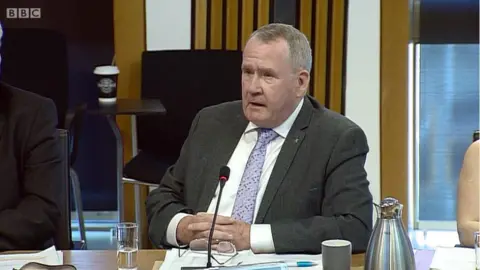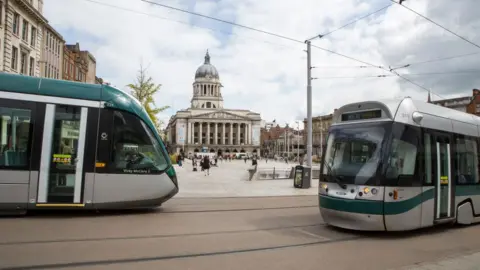MSPs back plans for tax on workplace car parking spaces
 Getty Images
Getty ImagesMSPs have backed plans to give councils the power to levy a tax on workplace car parking spaces.
The measure could see councils charge businesses an annual fee for every parking space they provide for workers.
Opposition parties said the move was a "regressive tax on workers", but the rural economy committee ultimately backed it by a vote of six to five.
Transport Secretary Michael Matheson said it would give councils a "modest and completely discretionary power".
The powers have been added in to the Transport (Scotland) Bill, which will still have to be signed off in a vote of all MSPs.
The SNP agreed to back the workplace parking levy proposals as part of a budget deal with the Scottish Greens earlier this year.
This would give councils the power to levy a tax on employers for each parking space they provide for employees, with the firms themselves then left to decide whether to pass the cost on to staff.
Councils south of the border currently have similar powers, although only Nottingham City Council has actually enacted such a scheme.
Officials from Nottingham told the committee in May that local politicians would need to be "very brave" and display "strong political leadership" to introduce workplace parking levies.

Amendments to add the powers to the transport bill were put forward by Green MSP John Finnie, who stressed that they were "a power not a duty" and a move to "empower local councils".
He added that "we need as many tools available to us as possible" to tackle the "climate emergency".
SNP backbencher John Mason said that "we have to discourage people from unnecessarily taking their cars to work", arguing that the move was a "tax on the elite".
However, the comments sparked controversy from opposition MSPs, with Labour's Colin Smyth saying it was an "utter disgrace" to suggest only the elite park at work, and Tory Jamie Greene saying "this could theoretically impact on any worker in Scotland".
'Empowering councils'
The committee's decision hinged on the vote of another SNP backbencher, Richard Lyle, who had previously been a critic of workplace parking levies.
In May, he said the levy was "an unfair tax on me and other motorists", saying he did not agree with charging people on lower incomes to park at work.
However, he ultimately voted in favour of the proposal, saying he had "considered very carefully the arguments" and come down in favour of "empowering councils and allowing them to decide upon which policy works best for their communities".
He added: "I know that I will have people who will come back at me because of comments I've previously made, but so be it. I've been a politician long enough, I've made up my mind and I will be supporting Mr Finnie's amendment."

Mr Lyle's change of position led Lib Dem Mike Rumbles saying he was "deeply saddened" that "the SNP members are being whipped to accept this".
He added: "It's quite obvious - stop playing games. This is too important to play games."
SNP member Stewart Stevenson hit back, saying it was "entirely improper" for the "individual process" that members use to come to a decision to be "traduced", adding: "Nobody dictates to me my views, I come to them honestly and independently."
'A pig in a poke'
The move was welcomed by environmental groups, but criticised by retailers.
Friends of the Earth Scotland said such levies were "clearly not right for every area", but said "city councils in Scotland dealing with congestion, insufficient resources for public transport and illegal levels of air pollution, should now investigate how they might use these powers".
The Scottish Retail Consortium said the move was "a charter for extra cost and complexity" and said it was "deeply disappointing" that MSPs had "voted for a pig in a poke".
Members also debated a series of potential exemptions to the levy, with more also expected to be put forward at the next stage of the legislative process. The government has already pledged that NHS workers will be exempt from charges.
The transport bill also includes a shake-up of Scotland's bus services and the introduction of low emissions zones in cities.
It is expected to be voted on by all MSPs sometime later in the year, after the summer recess.

How might the scheme work?
 Getty Images
Getty ImagesThe Nottingham model sees employers who provide more than 10 parking spaces for their staff pay about £400 every year to the city council for each space, with the charge increasing each year in line with inflation.
Some employers choose to foot the bill themselves - while others pass on some or all of the cost to workers.
The tax has raised about £9m a year since it started, with the money required by law to be spent on sustainable transport projects.
So far, it has helped to pay for an expansion to the city's tram network and a redevelopment of its main railway station, as well as supporting its fully-electric park-and-ride bus network and the Robin Hood integrated travel smartcard.
